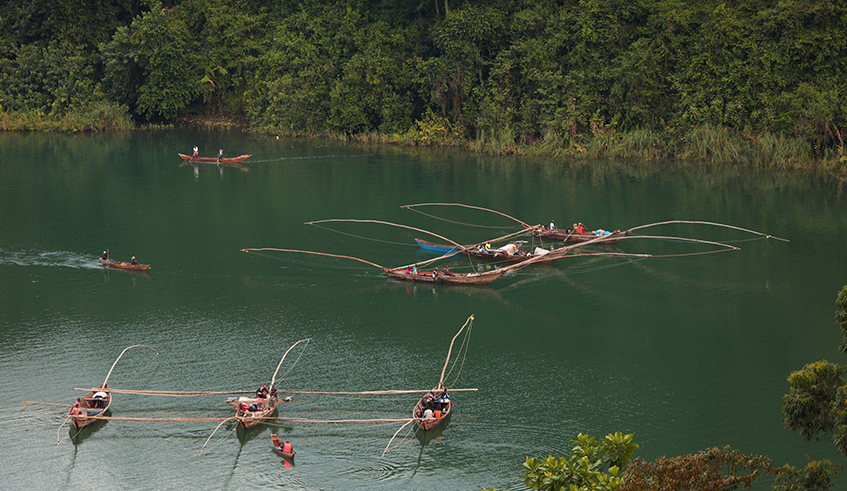

Fish production in Lake Kivu has plunged by 28 per cent over the last two years, occasioned by illegal fishing practices, which are characterised by the use of destructive equipment.
According to Solange Uwituze, the Deputy Director-General of Animal Research and Technology Transfer at Rwanda Agricultural Board, fish production in Rwanda’s largest water body reduced from 24,199 tonnes in 2017/18 to 17,296 tonnes in 2018/19 before plunging further to 16,194 tonnes in the 2019/2020 fiscal year.
The trend calls for urgent action to halt potential disappearance of the fish stocks in the country’s largest source of fish.
The reduction in 2020 was also fuelled by Covid-19 lockdown, Uwituze said, warning that the use of illegal fishing gear was threatening biodiversity in general.
"In the past two years, the production has reduced by 28 per cent due to illegal fishing and illegal fishing gear that affect fish reproduction,” she said.
The 28 per cent reduction means that about 7,000 tonnes of fish were lost due to illegal fishing.
With a kilogramme of fresh fish going for Rwf3,500, according to fishers, the 7,000 tonnes translate into a Rwf24.5 billion loss in the past two years.
Fish species produced in Lake Kivu mainly include sardines (Limnothrissa miodon locally known as Isambaza) and other species such as Tilapia and Haplochromis species locally known as Indugu farmed in fish cages.
"We want to closely work with local leaders to crack down on illegal fishing and destructive fishing gear. The fight against smuggled destructive fishing gear requires joint efforts. We are also going to license people who trade fishing nets and crack down on the illicit ones,” she said.
The official said that the recent ministerial order Ministerial Order Nº 001/11.30 of 11/12/2020 regulating aquaculture and fisheries has issued a list of legal fishing equipment, fishing hours and sites among others.
"The legal fishing gear only selects mature fish instead of destroying the reproductive cycle while illegal fishing gear catches both mature and young fish. This affects fish production,” she explained.
Why illegal fishing has persisted
Jean Kubwimana, a fisherman in Nyamasheke District explained that the legal fishing gear are more expensive compared to the smuggled ones.
"There are new legal fishing nets on the market but one costs Rwf700,000 while the smuggled illegal fishing net costs only Rwf400,000. In addition to low cost, the illegal equipment catches a lot of fish because they even kill younger fish while the legal ones catch only mature fish,” he explained.
He added that operating the legal fishing gear is costly considering that one or two persons can operate it and kill large quantities while the legal fishing net can be operated by 10 people, making it more expensive.
However, he said, the alleged illegal gear decreases fish production and spreads poison to the fish which can also affect consumers.
The plunders of fish stocks carry out their activities during the night, use small boats and switch off lights which makes them invisible.
Eliezel Ndahayo who represents seven fishing community cooperatives in Nyamasheke district said that in 2020, they grabbed and burnt over 980 illegal fishing nets worth Rwf400 million.
"We have embarked on a new drive to work with local leaders and marine security personnel to hunt those engaged in illegal fishing. Our cooperatives have also selected some of their members to help in fighting illegal fishing,” he said.
Currently, he said, the production has decreased from four tonnes per day to between 1.5 tonnes and three tonnes per day due to different circumstances affecting fishing in Lake Kivu.
Total national production stable
However, officials from RAB told The New Times that given increased investments in suitable valley dams and ponds, cage farming in other lakes and conserving lakes across the country, the national total production didn’t decrease.
Fish production in general across the country was 35,670 tonnes in 2019-2020 a slight increase from 31,465 tons.
"With fighting illegal fishing on Lake Kivu and produce from other lakes and fish farming, the national production is to increase to 45,000 tonnes in 2020-2021,” noted Uwituze.
Rwanda’s demand for fish is estimated to reach 112,000 tons by 2024.
The country’s fish produce falls short of its demand as it has been importing more than 15,000 tons per year.
Producing 112,000 tons by 2024 per year could help Rwanda attain the average sub-Sahara per capita consumption of 6.6 kilograms per person per annum and 265,600 metric tons to reach the global average of 16.6 kilos.


